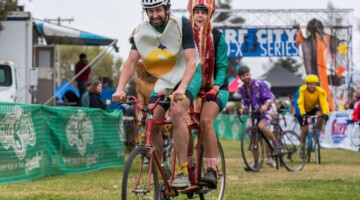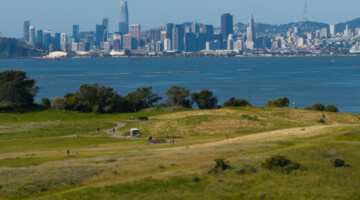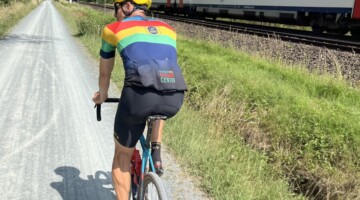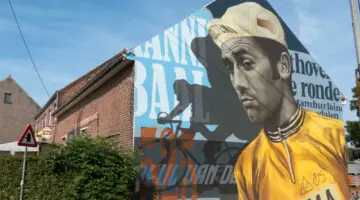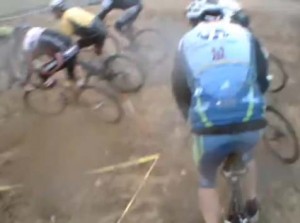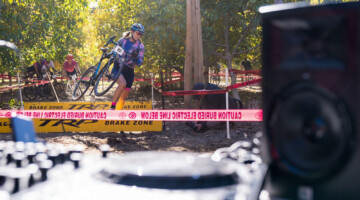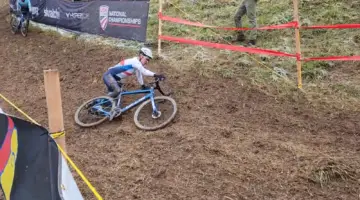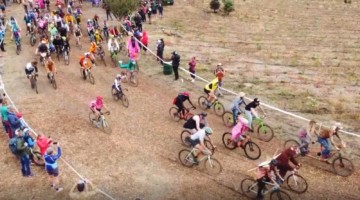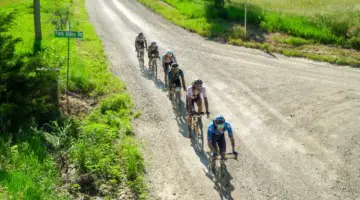“Follow Your Folly”
We here at Cyclocross Magazine like to say that ’cross is all about community. So when we hear about a group of people that are encapsulating that statement, we like to make sure they get recognized for their contribution. But it’s not too often that we get to highlight a company for supporting a few mud-lovers within its ranks. And, what’s more, it’s not too often that we get to highlight a beer company for their support. Today I get to do just that.
New Belgium Brewery has loved bikes from the very beginning. Many of you know the story already: founder Jeff Lebesch fell in love with brewing while on a bike tour in Belgium; the brewery’s most famous beer sports a bike on the label and the name Fat Tire; employees receive a free bike after one year with the company; and every summer hundreds of Fort Collins locals ride their bikes to New Belgium’s front lawn to sip a beer and watch an outdoor film—an event that generates $10,000 dollars that New Belgium donates to local non-profits.
Perhaps you’ve been part of the Tour de Fat, an annual bicycle festival put on by New Belgium, which hits 13 cities and not only features great beer, a parade and performances, but also a funeral procession for one volunteer’s car, which he or she has traded for a bicycle and a commitment to commuting on two wheels instead of four.
We can all get behind a company—especially a beer company—committed to increasing bicycle awareness. But what if I told you that New Belgium has a cyclocross course on company property. That in the spring you can head over and race a short track series there, and in the fall, a full blown, four-week ’cross series, with giant vats of Fat Tire, Sunshine Wheat, and 1554 brewing mere feet from where you’re leaping barriers. Now this is a company I can get in to.
I wanted to learn more about New Belgium’s ’cross course, so I chased down Jason Trujillo, New Belgium’s Quality Assurance Analyst, who I had been told was the man to speak to. Trujillo, for good reason, proved to be a tough man to pin down for a conversation. Not only is he in charge of making sure your next batch of Fat Tire has the right color, bitterness and carbonation that you expect, but he also does all the promotion and advertising for the New Belgium Short Track and Cyclocross Series; coaches a junior cycling team in road, BMX, MTB and ’cross; tries to keep up with his son Skyler, who competed in Worlds at Tabor and currently is at the US Euro Training Camp in Germany; and races whenever he gets the chance. I was able to grab him for a chat while he was working on a recent Saturday.
I asked Trujillo how the idea of a ’cross course on New Belgium soil got off the ground. “From the start we were looking to do some local stuff,” he said, “Boulder (Colorado) was a great model but was just too far away for us to get to during the week, and we were hearing people in our community say they wished there was something closer.” So five years ago when Jason, along with New Belgium’s lead mechanic KC McCuiston and IT engineer Lara Heckman, were sitting down for lunch one day, the idea of building a course on New Belgium’s property came up. “The property is perfect, most of it is being reclaimed and so nothing is being built. New Belgium’s motto is ‘Follow your Folly,’ so we went to [CEO] Kim Jordan and said that building a ’cross course was our folly.” The line worked: Jordan told them as long as they were willing to volunteer their time to do it right, the property was theirs to use.
The New Belgium Brewery spans 50 acres of land nestled into the northeast corner of Fort Collins, on what used to be a sugar beet factory. Behind the main building—itself an engineering and green building marvel—stretches the water treatment plant and a large expanse of open, tree spotted landscape currently under reclamation. The rolling, dusty terrain—which includes an orchard where employees have their own fruit tree planted after 10 years with the company—proved perfect for the weeknight series.
After getting the green light, it took nearly a year to clear the plan with the environmental health and safety department, do a risk assessment, and get the necessary insurance and waivers. “Once we could break ground, KC brought in a crew, made sure where the course was safe to go. He was the mastermind behind the course design,” said Trujillo.
According to Trujillo, a single-track wends and weaves around the property, jams up a 20-foot off-camber hill, u-turns at the top and then drops down into a slalom section between the water plant and the brewery. From there the course widens and passes through the company orchard before hitting a 200-foot swaying section made from old eight-foot-wide keg crates. New this upcoming season will be a rhythm section built out of wooden cradles which once held a new set of fermentation vessels. “It’s going to be sweet,” said Trujillo. Skyler, Trujillo’s son, calls the course “one of the best and least known about in Colorado.” Want a tour? Check out the helmet cam video below for a bumpy ride.
But it’s not the using of old shipping containers that makes the New Belgium course special, it’s what Trujillo and the other promoters are doing with the event. Entry fee? Five dollars. Racing license? Don’t need one. Junior? Your race is free. “We’re totally grassroots,” said Trujillo, “and our series has allowed the community the opportunity to try ’cross in a low key atmosphere. Without licensing or sanctions, there’s no intimidation, so we get people out here that wouldn’t try it otherwise.” And it works. The short-track series draws in nearly 300 racers from the small community, and roughly 150 for ’cross. For a small town, these are big numbers, and these racers are showing up for no other reason than to have a good time—as an unsanctioned event’s results don’t go towards any category upgrades. “We get bigger fields in our grassroots events here than the ACA does in theirs,” remarked Trujillo.
When the series first began, all profits were given right back to the racers—with cash prizes going eight deep in the open field. Kids are given coupons for ice-cream for racing or for cheering on their friends. “That’s just as important as racing,” said Trujillo. The give-back nature of the event started to catch on, and Trujillo told me of racers who gave back their prize money, telling him to pass it on to a non-profit. So, when Trujillo and his fellow promoters announced that there would be no more payouts and all money would be given to support the Fort Collins Junior cycling community, the positive feedback was unanimous: “Everyone was glad we had found a good place to put the money,” Trujillo said.
Now, all proceeds for the four-race series go to support Junior cycling and helping local riders get to big races (a fundraiser during last season also helped Skyler afford his trip to Worlds—with a proud father in tow). Last season, any Junior who raced in all four events had their National Interscholastic Cycling Association (a high school racing league) events paid for by New Belgium. “These three spend hundreds of hours to set up each race series and get none of the profit,” said Skyler in his blog. “All of the money that is made goes strait to a Junior cycling program that my dad is helping get off the ground.”
Even though New Belgium has a mostly hands-off relationship with the event, all of this giving back feels weirdly connected to the ethos of the company. In the first quarter of 2010 alone, New Belgium donated $91,000 to non-profit organizations—31 percent of which were bicycle advocacy groups, with an additional 27 percent going to youth environmental education. Co-opting packaging material for the ’cross course seems natural when your company already co-opts the methane off of its water treatment facility to power itself. It’s a rare thing to see the good works of the individual be mirrored by that of the company, but hey, when that company thinks that building a course for a bunch of dirty, bloody, screaming ’crossers is a good idea, you never know what might come of it.
I asked Trujillo about any employee rivalries on the ’cross course. “There’s one that went on between the engineering and guest relation departments,” he said. “At the races, they were only interested in beating each other. There were bets and banter going on all day. None of them had raced before, never would have thought of racing if we hadn’t put this course here.” Employees ride the course during their lunch breaks, and one, according to Trujillo, even runs four laps every morning before work (other employees prefer the yoga class held in the main lobby). And, it turns out, the benefits go both ways—Ryan Scalva volunteered to do lap timing for the series when it first began, and wound up getting hired by New Belgium as a Packaging Equipment Technician.
What about founder Jeff Lebesch? Trujillo laughed and gave me a line I’ve heard before: “He tried a ’cross race one time, threw up, and decided it was no fun at all.”
I had one final question for Trujillo: which New Belgium beer goes down best after a ’cross race? He was quick to respond: “The Belgium Trippel,” he said. “It has the highest calories, and the highest alcohol content; not super hoppy, it goes down easy. It’s like a recovery drink.”
Sold.
New Belgium Brewery course, via helmet cam:






